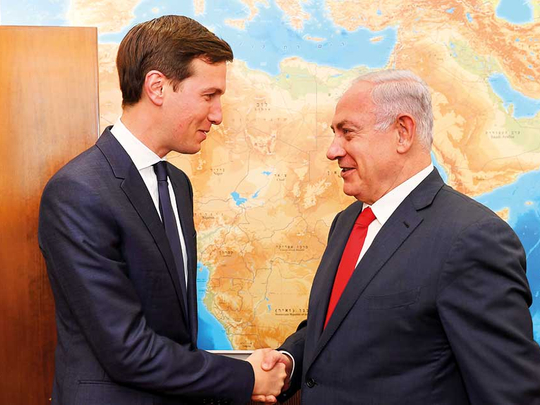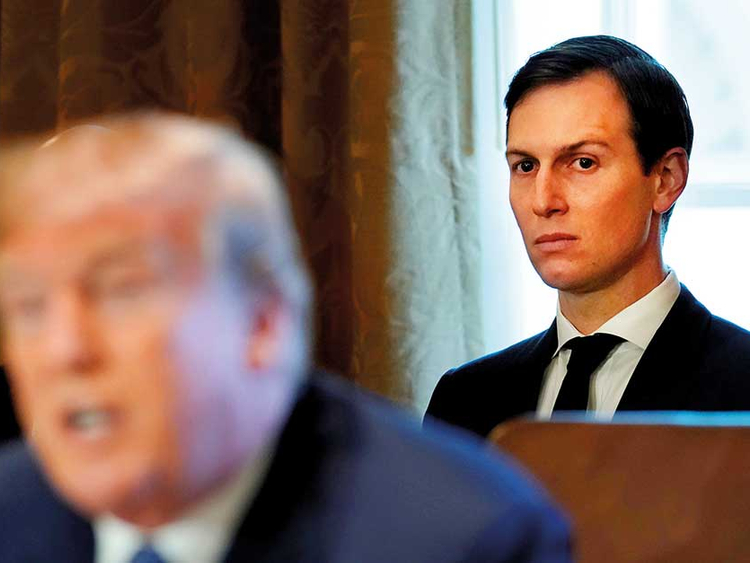
Dubai: The entire Middle East appears set to burst into flames after last week announcement by US President Donald Trump to recognise occupied Jerusalem as capital of Israel. The region was admittedly already teetering on the edge, but recent events have only made things worse. And while the mayhem should be apparent to any casual observer, what’s less obvious is Trump’s senior adviser and son-in-law Jared Kushner’s role in the chaos. The 36-year old is a Harvard graduate who seems to have a hard time filling in forms correctly.
He repeatedly failed to mention his meetings with foreign officials on his security clearance and neglected to report to US government officials that he was co-director of a foundation that raised money for Israeli colonies, considered illegal under international law. (He is also said to have told Michael Flynn last December to call UN Security Council members to get a resolution condemning Israeli colonies quashed. Flynn called Russia.)
In his role as the president’s special adviser, Kushner seems to have decided he can remake the entire Middle East.
- Donald Trump | US President
Details of the secretive deal are very murky so far.
Ahmad Tibi, a Palestinian parliamentarian in the Israeli Knesset, explained the basic contours of the deal to the New York Times: no full statehood for Palestinians, only “moral sovereignty.”
Control over disconnected segments of the occupied territories only. No capital in East Jerusalem. No right of return for Palestinian refugees.
This is, of course, not a deal at all. It’s an insult to the Palestinian people.
Soon after his inauguration, Trump assigned Kushner and US Mideast envoy Jason Greenblatt to try to restart stalled peace talks between the Israelis and Palestinians. Greenblatt and Kushner travelled repeatedly to the region and met multiple times with leaders on both sides of the dispute.
But Trump’s announcement on Occupied Jerusalem threatens to scotch the fledgling effort.
The Palestinians hope one day to place the capital of their nation in the eastern side of the city, which is presently occupied and claimed in its entirety by Israel.
Israeli Prime Minister Benjamin Netanyahu and other hardliners use the term “undivided” to describe the Jewish capital. Trump notably did not use that word in his announcement, and stressed that he didn’t intend to foreclose the possibility of a Palestinian state.
- A White House official
The US, he said, “is not taking a position on any final status issues including the specific boundaries of Israeli sovereignty in Jerusalem” and will continue to support “a two-state solution if agreed to by both sides.”
But Trump also made no distinction in his speech between east and west Jerusalem, and did not explicitly address Palestinian aspirations to place their future capital in the city. That omission is prompting international concern that the US can no longer play the role of a neutral arbiter between the sides.
Palestine Liberation Organisation Secretary General Saeb Erekat, the main Palestinian peace negotiator, said on Twitter after Trump’s remarks that “President Trump disqualified the US to play any role in any peace process.”
Kushner and Greenblatt say Trump’s decision could help prospects for peace. One of them, though, acknowledged short-term tensions and expressed frustration about international criticism of the announcement even before the details were known. The official anticipated there would be a “cooling-off” period.
The impact of the decision — and incentives for Palestinians to continue negotiations — will become clearer when Kushner’s team formally unveils an Israeli-Palestinian peace plan next year, the officials said. The precise timing of that roll-out remains unclear.
“There are things happening that people around the world don’t know about that will become known when the time is right,” a White House official said. “That is one of the reasons that the president is still very optimistic.”
Earlier this year when Kushner kicked off his Mideast tour, Palestinians called it “a do-or-die moment” in the Trump administration’s nascent Middle East peace process initiative, according to the Palestine Liberation Organisation’s representative in Washington.
At the time, Husam Zomlot, who took over as the head of the PLO Washington office this spring, said “Its now or never, we are hanging on this opportunity”.
The PLO had demanded, unequivocally, for the US to endorse a two-state solution.
Trump was agnostic on the issue in February and said he would favour a one or two state solution: “I like the one that both parties like.”
Trump’s move on Occupied Jerusalem hasn’t formally ruled out a Palestinian state but it remains to be seen how talks could now proceed since PLO officials have accused the US of being a dishonest broker and made statements like the “peace process is dead”.












